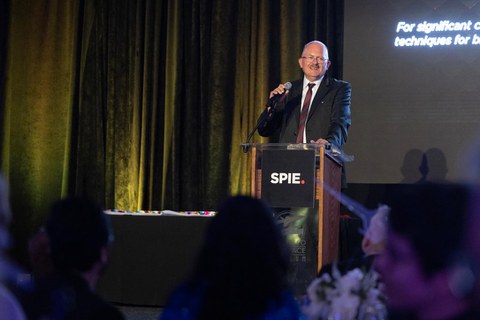SPIE Dennis Gabor Award in Holography
The international society for optics and photonics, SPIE has awarded Juergen Czarske, C4 professor of electrical and computer engineering, director of Computational Biomedical Laser Systems (BIOLAS) and coopted professor for physics at the TU Dresden, the 2024 Dennis Gabor Award in Diffractive Optics during a ceremony in San Diego Air and Space Museum
https://spie.org/news/jurgen-czarske-the-2024-spie-dennis-gabor-award-in-diffractive-optics#_=_At the awarding ceremony also the Nobel Laureate Physics 2023, Anne L'Huillier (Lund, Schweden) has won a prize of SPIE. Juergen Czarske was recognized “For significant contributions to the development of digital holography, and related techniques for biomedicine, fiber communication, imaging, information processing, and laser metrology”. Established in 1983, the Dennis Gabor Award of SPIE, the International Society for Optics and Photonics was named after the physicist and Nobel Laureate of 1971, who invented holography. Juergen Czarske´s outstanding accomplishments in diffractive wavefront technologies have advanced the development of digital holography and their applications such as green photonics, biomedicine, and fiber communications. Juergen Czarske introduced a truly game-changing paradigm shift in laser metrology by overcoming the diffraction-induced complementarity, which led to real-world applications in energy-efficient processes. Transfer of Artificial Intelligence to Holography will democratize applications in quantum communicationOver 10 Projects of DFG (German Science Foundation, Bonn) are running at the Czarske Lab, especially for biomedicine, including organoids, e.g. Tomographic refractive index measurement using Adaptive fiber-optical cel ROTation (TAROT) and Minimally Invasive 3D-Imaging using a diffuser and neural networks. The SPIE Dennis Gabor Award is based also on Project funding in information transmission such as Quantum communication for internet of things networks – QUIET, Fiber-based adaptive laser systems for secure backbone communication in 6G-life networks towards quantum communication, Physical Layer Security of Multimode Optical Fiber Transmission Systems.Juergen Czarske is a lifetime fellow of both, OPTICA (The Optical Society, Washington, DC, USA) and SPIE (The International Society for Optics and Photonics, Bellingham, WA, USA) and Fellow of EOS (European Optical Society, Joensuu, Finland), IET (Institution of Engineering and Technology, former IEE, London, UK), IOP - FInstP (Institute of Physics, London, UK). The Society SPIE has previously recognized Juergen Czarske, with its 2022 Chandra S. Vikram Award in Optical Metrology. The advisor of the SPIE-OPTICA Student Chapter at TU Dresden and elected vice president of the International Commission for Optics, Juergen Czarske is also an active member of multiple SPIE conference program committees.Juergen Czarske has received numerous international awards and recognition for his groundbreaking work in optics and photonics, including the 2019 Joseph Fraunhofer Award and the Robert M. Burley Prize from the optics and photonics professional society Optica in Washington D.C. Juergen Czarske is the recipient of a 2008 Berthold Leibinger Innovation Prize, an award that recognizes successes and innovations in applied laser technology, for the development of an interferometric laser sensor and its applications. Other honors include the 1996 AHMT Measurement Technology Prize, (AHMT: Arbeitskreis der Hochschullehrer für Messtechnik e.V., Munich), 2023 Honorary Speaker Award for 23rd StarRiver Talk, AI Lab, 2023 Qinghe Seminar Award, Chinese Academy of Sciences, 2024 Outstanding Reviewer Award, Light Science Application of Nature, and from the IEEE Photonics Society the inaugural 2020 Laser Instrumentation Award and 2024 Distinguished Lecturer. Juergen Czarske is also widely respected for his work with students: some of the prizes his students and postdocs have won include the Science Award of the Gisela and Erwin Sick Foundation; the German Society of Applied Optics’ Young Scientist Award; and the Bertha Benz Prize, an award for female engineering students who have incorporated social-added value in their dissertations.
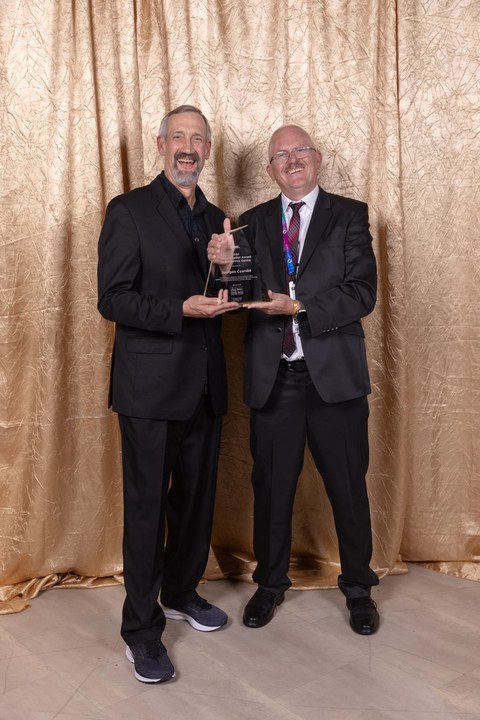
Dennis Gabor Award. Left: SPIE president elect 2024, Dr. Peter de Groot, Right: Prof. Czarske

Dennis Gabor Award Prof. Czarske

Dennis Gabor Award Prof. Czarske
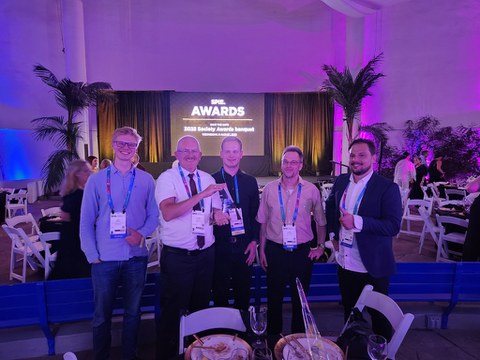
Left second: Prof. Czarske
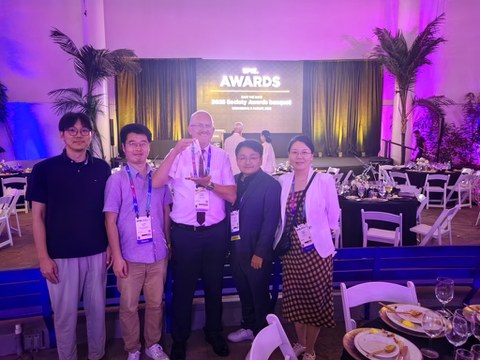
middle: Prof. Czarske
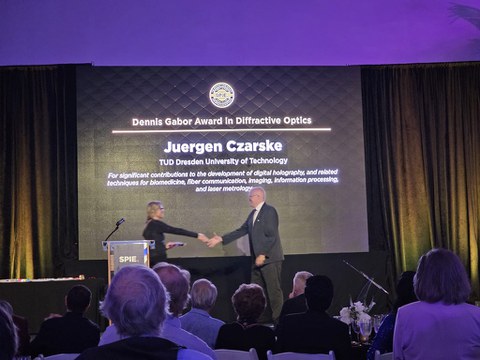
Left: SPIE President Prof Jennifer Barton, Right: Prof. Czarske
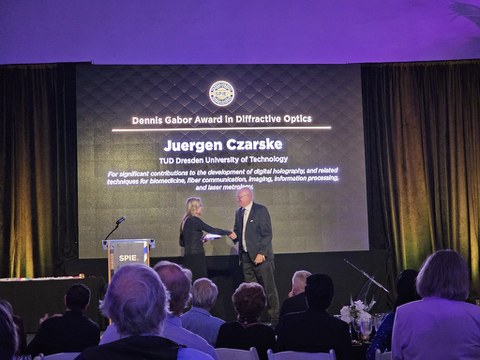
Left: SPIE President Prof Jennifer Barton, Right: Prof. Czarske
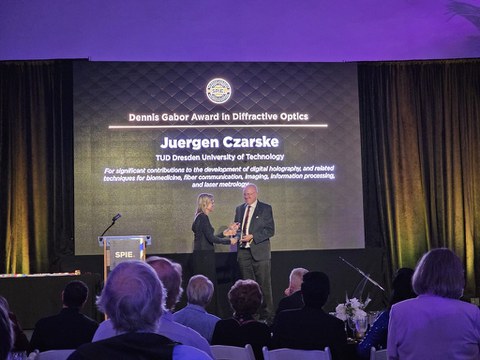
Left: SPIE President Prof Jennifer Barton, Right: Prof. Czarske
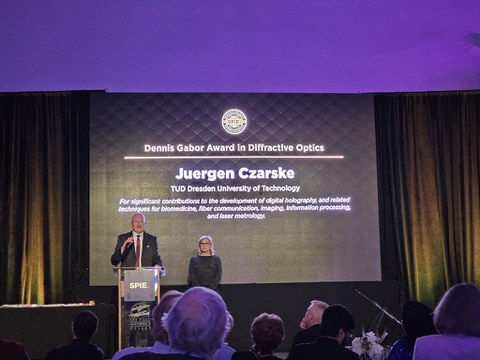
Left: Prof. Czarske, Right: SPIE President Prof Jennifer Barton
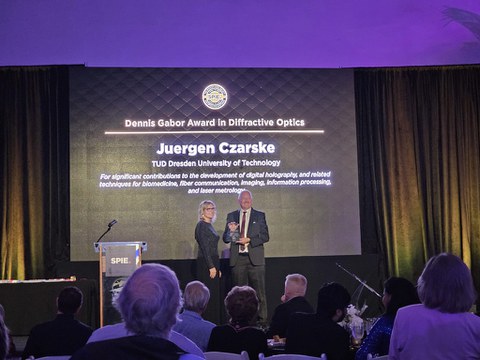
Left: SPIE President Prof Jennifer Barton, Right: Prof. Czarske

